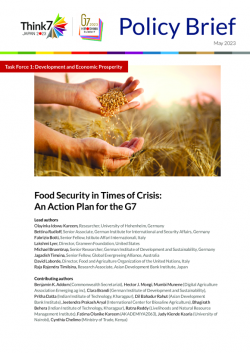Food Security in Times of Crisis: An Action Plan for the G7
The number of people who are undernourished—suffering from chronic hunger and a lack of access to safe, nutritious, and sufficient food—has increased due to trade disruptions and bottlenecks that impact prices, stringent food trade policies and supply chains, and postharvest losses. This issue requires urgent humanitarian assistance. Mitigating the problem demands practical solutions at the global level and active Group of Seven (G7) participation, as the current food security political focus is mostly reactive toward crises and risks that wane quickly whenever global food prices decrease. Thus, the following are the main reasons the G7 should prioritize food security in 2023: (i) a moral and human rights-based imperative supported by the idea of the Sustainable Development Goals to eradicate hunger and all forms of malnutrition to attain a minimum level of shared prosperity, especially in the context of climate change; (ii) the G7 has committed to do it through the Elmau and other commitments; (iii) the G7 is more than ever a key element of the global security agenda. To address global food insecurity, we propose that the G7 (i) works with partners to contribute to a transparent and stable global environment for agri-food trade and investments, (ii) reforms its food policy to contribute to global food security through inclusiveness in the context of global rebalancing, and (iii) invests in Global South food systems by focusing on the nexus between gender, climate, and digital technologies.
-
Dati bibliografici
(with Olayinka Idowu Kareem, Bettina Rudloff, Lakshmi Lyer, Michael Brüntrup, Jagadish Timsina, David Laborde, Raja Rajendra Timilsina), in Think7 Policy Briefs, May 2023, 11 p.
Tema
Tag
SDG
Contenuti collegati
-
Ricerca31/05/2024
Think7 (T7)
leggi tutto




